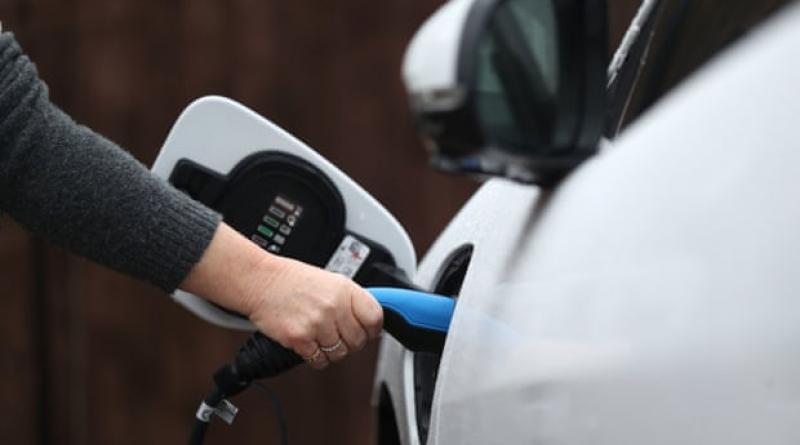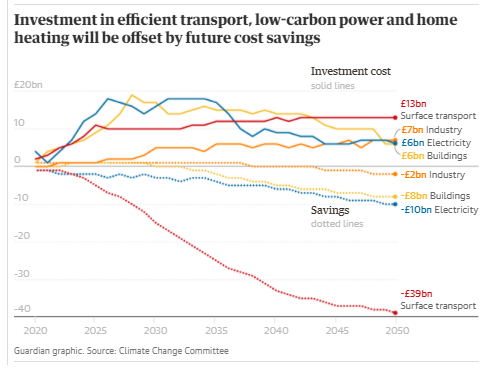Ending UK’s climate emissions ‘affordable’, say official advisers.

CCC recommendation includes half of cars being electric by 2030, gas boilers phased out and 10,000 wind turbines.
The world’s first detailed route map to ending a nation’s use of fossil fuels is both “ambitious and affordable”, according to the UK government’s official advisers, and would see half of the cars on the road being electric by 2030 and 10,000 giant wind turbines in the North Sea.
The Climate Change Committee’s analysis found that the future cost savings from no longer having to buy oil and gas almost offsets the £50bn-a-year investment needed in low-carbon power, transport and home heating across the next three decades.
The eyes of the world are on the UK as it prepares to host a critical UN summit to tackle the climate crisis next November and UK leadership is considered vital for success. The prime minister, Boris Johnson, recently announced a green industrial revolution plan, but the CCC said further action was needed now from the government to set the UK on the path to ending emissions by 2050.
The CCC route map forecast people’s energy bills remaining level, before falling after 2030 as cheap renewable energy expands. Electric cars will also save drivers money but a phase-out of gas boilers will mean some households will require government help to install more expensive low-carbon heating systems, the CCC said.
The plan envisages air travel staying near current levels and meat eating, which is already falling, being reduced by just 20% by 2030. Changes in how people live “need not entail sacrifices”, the CCC said. It said mixed woodlands covering an area three times the size of Greater London should be planted by 2035, capturing CO2 and providing new green spaces.
The cost of offshore wind power has plummeted in recent years and the CCC sees it as “the backbone of the whole UK energy system”, with all electricity being renewable or nuclear by 2035. The UK will become an electric nation, the CCC said, with double the current amount of power being generated by 2050, but with hydrogen expanding to fuel heavy industry and transport and warm some homes.
The CCC also set out a new carbon budget for the UK for 2035, as required by law. CO2 emissions are to reduced by 78% compared with 1990 levels, equivalent to cutting two-thirds of today’s emissions. The CCC said this advanced carbon cuts by 15 years compared with plans in 2018, reflecting falling green costs.
Getting to net zero emissions is “ambitious, realistic and affordable”, said Lord Deben, chair of the CCC. “The price is manifestly reasonable. It will be the private sector that will do much of the investment but it will be the government that sets the tone.”
“It now has to set out in detail the steps required,” he said. “As we emerge from the Covid-19 pandemic, this is a chance to jump-start the UK’s economic recovery.” But Deben added the costs of the transition must be distributed fairly across society. The government has accepted all previous carbon budgets proposed by the CCC and has until June 2021 to accept the new one.

The CCC analysis found it is cheaper to transition to electric cars and vans than to continue with petrol and diesel vehicles. “That’s an amazing new insight, because it has major implications for the overall cost of achieving net zero,” said Chris Stark, chief executive of the CCC.
The annual net cost across the 30 years to 2050 is £10bn, or about 0.5% of GDP, the CCC said. This does not include the benefits of new jobs or better health as air pollution and damp, cold homes are reduced. Today, poor housing alone costs the NHS £1.5bn a year. “It’s now clear that – at worst – we’ve got a very small cost overall in order to unlock those very big benefits of tackling climate change,” said Stark.
Alison Doig, at the Energy and Climate Intelligence Unit, said: “The report demonstrates that taking bold action makes sense for jobs and prosperity, but also keeps the UK at the forefront of an international zero carbon revolution. The government can show it is serious about delivering the goals of the Paris agreement by taking [the CCC] advice.”
Prof Rob Gross, director of the Centre for Energy Policy and Technology, said the CCC reports were hugely significant. But he said the major expansion of both renewable energy and electric cars would be challenging: “The speed with which we would need to get charging stations sorted out is a real challenge, if we are to avoid alienating motorists.”
Clara Goldsmith, at the Climate Coalition, said: “The government must accept this advice and unleash a decade of ambitious action. There is no downside to embracing this plan. It can transform our society and create hundreds of thousands of green jobs.”
Doug Parr, at Greenpeace UK, said: “The CCC may have set out its paths to net zero but we’ll need much more legwork from the government over this parliament to reach it. While some progress has been made recently there remains a yawning gap between our targets over the next decade and action needed to meet them.”
Stark said the climate crisis was worsening, with global CO2 emissions and temperature still on an upward trend: “We are in a bad place.” But he said 2021 would be a big year for action in the UK, with government strategies due for heat and buildings, food, aviation, hydrogen and trees and peat bogs. “It is the actions to deliver [net zero emissions] that are important now.”
9 December 2020
The Guardian




